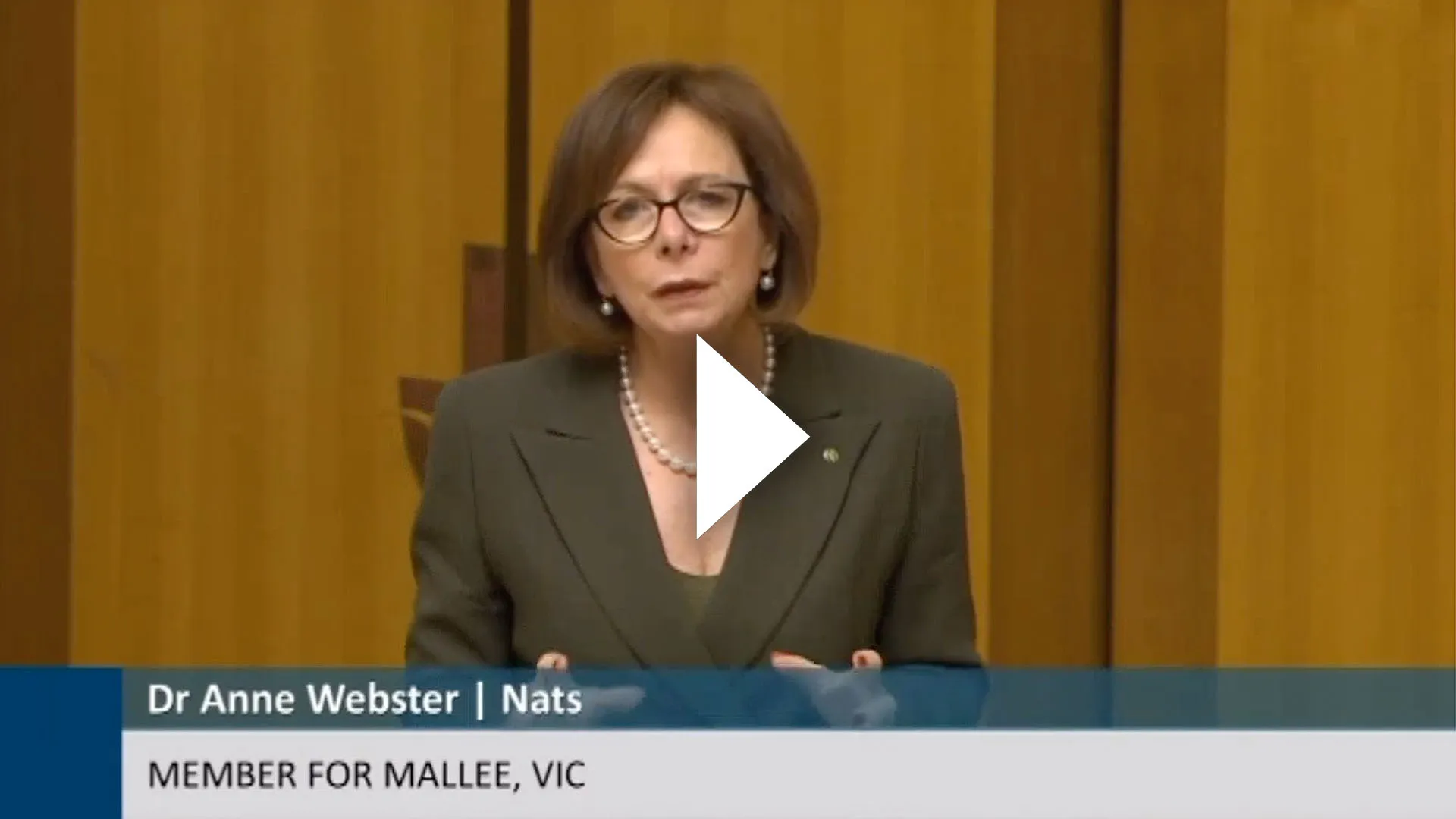Ratepayers, Shires and Councils need Labor to restart sustainability inquiry - Media Release

DR ANNE WEBSTER MP
Shadow Minister for Regional Development, Local Government and Territories
Shadow Minister for Regional Communications
Member for Mallee
Ratepayers, Shires and Councils need Labor to restart sustainability inquiry
Wednesday 4 June 2025
The Albanese Labor Government must re-start the unfinished inquiry into the sustainability of over 530 Australian shires and councils as soon as Parliament returns late next month, Shadow Minister for Local Government Dr Anne Webster MP said today.
“Fourteen months ago Local Government Minister King said she had referred the local government sustainability inquiry to the Standing Committee on Regional Development, Infrastructure and Transport because local government faced ‘pressing issues’ and that the inquiry was ‘long overdue’,” Dr Webster said.
“Fellow Minister Kristy McBain welcomed the inquiry saying it built upon feedback received in the preceding 18 months. Yet the Labor-dominated Inquiry only delivered an interim report 11 months after it started, and the Inquiry was then prorogued for the election.
The call comes amid criticism of the lowest number of parliamentary sitting days in 20 years this calendar year, with parliament currently on a 10-week break.
“The Inquiry’s interim report made no recommendations, but submissions suggested changes to the Financial Assistance Grants, the Intergovernmental Agreement on Federal Financial Relations, horizontal equalisation, natural disaster mitigation preparations and even National Cabinet,” Dr Webster said.
“I call upon the Minister as a first order of business when Parliament resumes to re-open the inquiry and let it deliver a final report.
“In my own north-western Victorian electorate of Mallee, small shires consistently tell me they are struggling financially – and I am putting that mildly. Faced with a myriad of divisive energy project proposals, some have sought funding for additional staffing to cope with all the analysis and community consultation expected of them. On Sunday, South Australian councils spoke out about their struggles to keep up with backlog road maintenance and developing community infrastructure.”
Meanwhile, ABS data in February analysed by money.com.au indicated that in capital cities, Canberra’s rate increases had been up 83 per cent over 10 years, compared with Hobart’s 46 per cent, Brisbane 43 per cent, while Melbourne matched Australia’s overall average increase of 39 per cent.
In March, the Essential Services Commission of South Australia’s regular review indicated more councils were potentially unsustainable, including the Adelaide City Council and the District Council of Loxton Waikerie.
Sydney’s Northern Beaches Council recently secured a 25.2 per cent rate increase after the NSW Independent Pricing and Regulatory Tribunal (IPART) acknowledged its current position was unsustainable long term and had an infrastructure backlog. The Council had sought a 39.6 per cent increase.
“The Nationals fought hard last month to ensure the Coalition remains laser-focussed on a Regional Australia Future Fund which will deliver funding, in perpetuity, for regional Australia. Regional councils and shires often depend on grants to deliver infrastructure – they don’t have the alternate means of raising revenue that city councils do. Rural councils increasingly are also the only organisation in town that can end childcare deserts, deliver appropriate home care services for the aged and NDIS users. Shires are holding back because they are being fiscally responsible, fearing for their long-term viability,” Dr Webster said.
“I also fear for regional communities suffering record low rainfall, drought, flooding or other unfolding natural disasters that will make it even harder to approach their ratepayers to stay financially sustainable.
“While The Nationals will advocate for the Regional Australia Future Fund policy right through to the next election, this Local Government Sustainability Inquiry - and the evidence of shires and councils on the brink of collapse - must be presented and debated urgently.”
The inquiry’s Terms of Reference were:
• The financial sustainability and funding of local government
• The changing infrastructure and service delivery obligations of local government
• Any structural impediments to security for local government workers and infrastructure and service delivery
• Trends in the attraction and retention of a skilled workforce in the local government sector, including impacts of labour hire practices
• The role of the Australian Government in addressing issues raised in relation to the above



